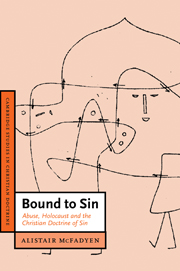Book contents
- Frontmatter
- Contents
- Acknowledgments
- Part I Drawing into Conversation
- Part II Concrete Pathologies
- Part III Testing the Inheritence
- 6 Willing
- 7 Power and participation: feminist theologies of sin
- 8 Augustine's will
- 9 A question of standards: trinity, joy, worship and idolatry
- 10 Concrete idolatries
- Index of names
- Index of subjects
10 - Concrete idolatries
Published online by Cambridge University Press: 02 December 2009
- Frontmatter
- Contents
- Acknowledgments
- Part I Drawing into Conversation
- Part II Concrete Pathologies
- Part III Testing the Inheritence
- 6 Willing
- 7 Power and participation: feminist theologies of sin
- 8 Augustine's will
- 9 A question of standards: trinity, joy, worship and idolatry
- 10 Concrete idolatries
- Index of names
- Index of subjects
Summary
The previous chapter extrapolated out from the intimations in Augustine's construal of willing and of sin in order to characterise the necessarily theological construction he places on the dynamics of willing. This has given specifically theological content to the pathological dynamics of bound willing: in sin, the will is bound into the dynamics of idolatry. Thus, the bondage of the will hypothesis, which has proved its explanatory power through the course of the preceding deliberations, has now been given a specific, theological expression (in the course of which, the understanding of idolatry has itself been enriched). It is worth now returning to the concrete pathologies in order directly to test the explanatory and descriptive power of this theological identification of core pathology.
Does sin as idolatry hold descriptive and explanatory power in relation to concrete pathologies? Can the pathological dynamics of sexual abuse of children and the holocaust be re-expressed in terms of idolatry? if so, does that yield a richer comprehension of them? In answering these questions, what will we be looking for?
To worship is actively to orient and order one's life, whether more or less explicitly, around a reality as primary to and constitutive of meaning, worth, truth and value. In more dynamic terms, it is for one's personal energy (spirit) to be energised by and oriented towards this reality as the energising ground and criterion of active life-intentionality. Thus what is worshipped is an absolute, unconditional and therefore exclusive horizon of loyalty to which all else is related and in the service of which all is done.
- Type
- Chapter
- Information
- Bound to SinAbuse, Holocaust and the Christian Doctrine of Sin, pp. 227 - 249Publisher: Cambridge University PressPrint publication year: 2000



